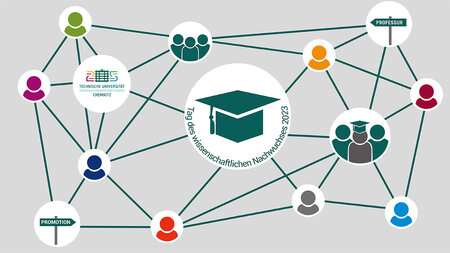++ Latest Information ++
The training programme for summer term 2024 offered by the Centre for Junior Scientists are now online.
Training Programme
The Centre for Junior Scientists offers a wide range of training opportunities for early-career researcher as well as interdisciplinary workshops leading to additional qualifications.
Our main aim is to pursue the concept of lifelong learning by supporting early-career academics in their personal development at the start of their careers. Doctoral candidates and postdocs are empowered to transfer and apply the contents of key and leadership competences in other current and prospective fields.
Our training programme support junior scientists in completing their doctorate. Furthermore, courses to acquire key competencies which are necessary both for an academic and non-academic career are offered. The programme is complemented by seminars which provide international research competencies to prepare for working in international scientific and academic communities.
The courses are aimed at doctoral candidates, postdocs, habilitands and junior professors at the TU Chemnitz.
This workshop is aimed in particular at natural scientists (Faculties for the Natural Sciences, Mathematics, Mechanical Engineering, Electrical Engineering and Information Technology as well as Computer Science).
Ph.D. candidates and scientists often struggle with writing journal articles or their theses, while simultaneously completing time-consuming research projects. In addition, the standards for the publication of journal articles are increasing so there is pressure to publish high quality papers. Unfortunately, Ph.D. candidates and scientists often do not receive any formal training to improve their scientific writing. Instead, they learn “by doing”, and by making mistakes. This lack of training is a serious problem. Scientists have the responsibility to communicate their findings to their peers, and writing is the key to communicating scientific results. Scientific findings can only be used effectively if scientists are able to clearly communicate them. With discipline and commitment, scientific writing is a skill that can be learned and mastered. In this workshop, Andrea Sanchini will work with participants to develop a set of “how-to” strategies for writing journal articles and theses, and for increasing writing productivity.
Included Topics:
- Common challenges and misunderstandings in scientific writing
- How to organize the flow of information
- The sections of a scientific article
- The stages of the writing process
- Different types of writers
- Techniques and software available to increase writing productivity
- Clear scientific writing
- Motivational tools to increase writing productivity
- How to reduce procrastination and perfectionism
- Teamwork with co-authors and supervisors
| Date: | 26. - 28.06.2024 | 09:00-13:30 Uhr |
| Lecturer: | Dr. Andrea Sanchini |
| Location: | The workshop will take place online. |
| OPAL-Link: | 26. - 28.06.2024 | ONLINE | Scientific Writing: Towards Organization and Motivation (STEM) | Dr. Andrea Sanchini |
In dieser Workshopreihe mit Gruppencoachingcharakter kannst Du Dich auf inspirierende Impulse und abwechslungsreiche praktische Übungen mit individuellem Feedback sowie bestärkenden Austausch freuen. In einer festen Gruppe trainieren wir intensiv und wertschätzend Deine kommunikative Wirkung - von innen nach außen: Selbstwert und innere Stärke, Kraft und Gelassenheit sowie Souveränität und Strahlkraft.
Erkenne Deinen Selbstwert und reflektiere Deinen persönlichen Selbstanspruch. Entdecke Dich selbst aus neuen Perspektiven und stärke Dich von innen. Du gewinnst mehr Gelassenheit und Souveränität für Deinen Alltag, zum Beispiel für Gespräche und Präsentationen. Zudem lernst Du wirkungsvolle Methoden für gelungenes Storytelling und trainierst neben Deiner Rhetorik Deinen Körper und Deine Stimme gezielter einzusetzen. Wir wagen spannende Mutausbrüche und Du wirst über Dich selbst hinauswachsen. Vor allem aber haben wir Spaß, uns im Miteinander zu bestärken und Deine kommunikative Wirkung weiterzuentwickeln.
- Mein Selbstwert! Selbstbewusst und souverän: Erkenne Deinen Selbstwert und reflektiere Deinen persönlichen Selbstanspruch.
- Meine innere Stärke entdecken und stärken: Entdecke Dich selbst aus neuen Perspektiven und stärke Dich selbst von innen.
- Das bin ich! Kraftvoll und gelassen: Stell Dich selbst prägnant und erinnerungswürdig vor. Gewinne mehr Gelassenheit und Souveränität für Deinen Alltag, Gesprächen und Präsentationen.
- Meine Geschichte! Storytelling mit Wirkung: Berichte wirkungsvoll und stärkend von Deinen Erfahrungen und lerne Methoden für gelungenes Storytelling kennen.
- Meine kommunikative Wirkung stärken! Sprache, Sprechen und Körpersprache: Trainiere, Deine Rhetorik, Körpersprache und Stimme gezielter einzusetzen.
| Date: | 06. & 20.08.2024 | 09:00-16:00 Uhr |
| Lecturer: | Dr. Stephanie Rohac |
| Location: | Der erste Veranstaltungstag (06.08.2024) wird online, der zweite (20.08.2024) im Universitätsteil Straße der Nationen 62 stattfinden. |
| OPAL-Link: | 06. & 20.08.2024 | ONLINE & PRÄSENZ | Female Power! Selbstbewusst und wirkungsvoll kommunizieren für Frauen | Dr. Stephanie Rohac |
“Chance favors only the prepared mind” - the wisdom of Louis Pasteur also applies to your career path. In the workshop we will therefore explore elements of a career strategy: I will share tools that help you identify your values, transferable skills, and strengths. We will look at how you can use storytelling and leverage networking to gain visibility – no matter if you want to pursue a career in academia or in other sectors. Finally, we will discuss concrete examples of standard and out-of-the-box application strategies. There will be time for your questions as well.
| Date: | 08.08.2024 | 09:00-15:00 Uhr |
| Lecturer: | Dr. Anne Schreiter |
| Location: | The workshop will take place in the university section Straße der Nationen 62, Hauptbau, 2nd floor, room A10.202. |
| OPAL-Link: | 08.08.2024 | PRESENCE | Building your career strategy – a guide for your next career steps in academia or beyond | Dr. Anne Schreiter |
Die Universitätsbibliothek bietet vielfältige Unterstützungen im Open Access Publikationsprozess. Dazu zählen auch Transformationsverträge und Publish & Read Verträge. Welche Publikationsmöglichkeiten bieten solche Verträge, mit welchen Anbietern hat die Universitätsbibliothek Vereinbarungen geschlossen. Im Kurs werden die Vereinbarungen vorgestellt, die Rahmenbedingungen und Besonderheiten benannt.
Inhalte:
- DEAL Verträge
- Royal Society of Chemistry
- American Chemical Society
- Taylor & Francis
- Hogrefe etc.
| Date: | 19.08.2024 | 13:00-14:00 Uhr |
| Lecturer: | Sabine Kuniß | Universitätsbibliothek |
| Location: | Die Veranstaltung findet im hybriden Format statt (Universitätsbibliothek, Beratungsraum 3. Etage Raum 311). |
| OPAL-Link: | 19.08.2024 | HYBRID | Transformationsvertrag, Publish & Read – Was ist das und was bedeutet es für die Wissenschaftler:innen an der TUC | Sabine Kuniß |
Wissenschaftskommunikation und der Transfer wissenschaftlicher Erkenntnisse in „die Gesellschaft“ gewinnen an Bedeutung und werden zunehmend auch in Ausschreibungen öffentlicher Geldgeberinnen wie DFG oder BMBF gefordert. Davon abgesehen ist eine gelungene und den verfügbaren Ressourcen entsprechende Wissenschaftskommunikation aber auch wertvoll für die eigene forschende Arbeit und die Auseinandersetzung mit einem spezifischen Forschungsprojekt.
Der Workshop adressiert drei wesentliche Bereiche: Grundlagen der Wissenschaftskommunikation, Formate und Ressourcen im wissenschaftlichen Alltag sowie das praktische Ausprobieren und Planen einer eigenen Kommunikationsstrategie. Alle drei Bereiche werden miteinander verzahnt und in Abstimmung mit den Teilnehmenden gewichtet.
Am Ende des Workshops sollen die Teilnehmenden in der Lage sein, sich kritisch und zielorientiert mit Formaten der Wissenschaftskommunikation auseinanderzusetzen und diese auf eigene Forschungsvorhaben zu beziehen. Neben grundlegenden Werkzeugen werden Unterstützungsressourcen innerhalb und außerhalb der Universität vermittelt.
| Date: | 22.08.2024 | 09:30-17:30 Uhr |
| Lecturer: | Ingmar Rothe |
| Location: | Die Veranstaltung wird im Universitätsteil Straße der Nationen 62, Hauptbau, 2. Etage, Raum A10.202 stattfinden. |
| OPAL-Link: | 22.08.2024 | PRÄSENZ | Wissenschaft kommunizieren | Ingmar Rothe |
Successful grant proposal writing is a fundamental basis to fund a career in research. There are plenty of national and international funding programmes with different funding schemes. Each scheme has its individual context and thematic focus, eligibility and funding rules, submission and evaluation process, and evaluation criteria. Thus, the detailed features and aspects of a successful proposal in one funding scheme are naturally differing from those of a successful proposal in another funding scheme. However, the process of how to work out these details is a common denominator to the different funding schemes. It requires skills way beyond the ability to work out a research idea in detail.
Therefore, this workshop focuses on a) how to develop your idea for a project into a sound work programme, b) how to match it to the requirements of the funding programme and c) how to facilitate the communication with the reviewer by presenting your complex ideas in an easy-to-understand way.
To achieve this, we will try out the RaumZeit Toolkit for designing and communicating your research project convincingly by working on your own research project. This may be a new idea for a real grant proposal or your current research project.
Besides, you will obtain a lot of background information on different funding programmes, evaluation processes and potential pitfalls.
Contents:
- Funding programmes and how to read the documents
- Develop your idea into a work plan
- Communicate your project convincingly
- Impact and Budget
Technical and other requirements for a successful participation
Workshops in a virtual room have their own technical challenges. Please make sure, that you have prepared
- an idea for a research project, for which you have not written a grant proposal yet. If you do not have one you can work on your current research project.
- a computer or laptop with keyboard, mouse (!) and one or two monitors (mobile phone is too small).
- a headset.
Results to take home
At the end of the workshop, the participants will have the following results:
- An overview on funding possibilities and helpful sources of information
- A list of contact points, websites and phone numbers, which provide support and detailed answers to questions
- A set of tools for efficiently developing research ideas into research projects and designing them to a funding program of interest
- Commented examples on proposal building blocks
- Concise building blocks for different parts of a proposal: work plan, Pert-diagram, objective, innovative aspects, impact.
| Date: | 27.08., 28.08., 04.09. & 11.09.2024 | 09:00-12:30 Uhr |
| Lecturer: | Dr. Sabine Preusse |
| Location: | The workshop will take place online. |
| OPAL-Link: | 27.08., 28.08., 04.09. & 11.09.2024 | ONLINE | Grant Proposal Writing - How to design and communicate your project convincingly | Dr. Sabine Preusse |
In an increasingly confusing world, you often miss out on important information if you are not in close contact with others. You don't hear about job offers, don't know anyone for a research cooperation or don't get helpful tips from experts. Therefore, the workshop will cover general basics of networking as well as the question which contacts seem to make sense for you and how and where they can be established and maintained. In this context, the topics conversation and social networks on the internet will be considered.
Specifically, the following topics are addressed:
- The basic rules of successful networking including dos and don'ts
- Your competences, networking goals and helpful contacts
- Situations, events and internet platforms suitable for your networking
| Date: | 03.09.2024 | 09:00-12:00 Uhr |
| Lecturer: | Dr. Alexander Egeling |
| Location: | The workshop will take place online. |
| OPAL-Link: | 03.09.2024 | ONLINE | Networking | Dr. Alexander Egeling |
Join us for an enlightening online workshop dedicated to addressing gender and unconscious biases within the academic and scientific community. This interactive session is designed to deepen your understanding of diversity and inclusion, identify and challenge your own unconscious biases, and explore effective strategies for fostering a more inclusive research culture.
Why should you attend?
In the realm of science and academia, embracing equality and diversity is not just a moral imperative but a cornerstone for enhancing research quality and embracing varied perspectives. This workshop offers a foundational step towards understanding and addressing the subtle yet impactful ways in which unconscious biases and gender biases influence our professional environments and interactions.
What can you expect?
Interactive Learning: Engage in meaningful discussions, share your experiences, and learn from your peers to gain diverse insights.
Theoretical Insights: Receive a comprehensive introduction to the concepts of unconscious biases and gender equality, and understand their significant impact on the scientific community.
Case Studies and Practical Solutions: Tackle real-life scenarios from the academic world, analyze them, and formulate actionable strategies to overcome biases.
Tools for Everyday Science: Discover practical approaches and tools to cultivate an inclusive research environment and minimize unconscious biases in your daily academic life.
Your participation matters!
Your commitment and perspectives are vital for the success of this workshop. We believe that each one of you can contribute significantly to making the scientific world more inclusive and diverse.
Zielgruppe: Die Veranstaltung richtet sich vorrangig an ESF-geförderte Promovierende und ESF-Nachwuchsforschungsgruppen und wird seitens des SAB als Qaulifizierungsmaßnahme im Bereich des Gleichstellungswissens anerkannt.
| Date: | 09. & 16.09.2024 | 09:00-12:30 Uhr |
| Lecturer: | Maria Prahl |
| Location: | The workshop will take place online. |
| OPAL-Link: | 09. & 16.09.2024 | ONLINE | Gender & Unconscious Bias: How to Break Thinking Patterns and Avoid Exclusion | Maria Prahl |
Die Entscheidung für oder gegen eine Promotion ist genauso an die soziale Herkunft gekoppelt wie die Studienentscheidung. Anhand des Bildungstrichters lässt sich erkennen, dass gerade einmal zwei von 100 Studierenden ohne akademische Vorbilder im familiären Umfeld nach ihrem Studium promovieren. Und wenn die mutige Entscheidung für eine Promotion getroffen ist, gestaltet sich das Promovieren aufgrund fehlender Netzwerke und Erfahrungswerte sowie Selbstzweifeln häufig schwierig. Daher möchten wir unser Workshop-Angebot auf der strukturellen Ebene die Herausforderungen und Chancen einer Promotion diskutieren. Zudem werfen wir einen Blick auf die individuellen Stärken der Teilnehmenden, geben Tipps rund um den Aufbau und das Nutzen eines unterstützenden und tragfähigen Netzwerkes mit dem Ziel anhaltende Unterstützung in der Promotion zu sichern.
Inhalte:
- Einstieg ins Thema (Bildungstrichter)
- Privilegiencheck
- Interview mit den Ehrenamtlichen von ArbeiterKind.de: Herausforderungen und Chancen einer Promotion
- Übung: Mit den eigenen Stärken die Promotion meistern
- Netzwerke aufbauen und für die Promotion nutzen
Ziel der Veranstaltung:
Die Teilnehmenden
- erkennen die strukturellen Hürden einer Promotion
- erarbeiten sich ein erstes Stärkenprofil
- bauen ihre Netzwerkskills aus
- fühlen sich als ein Teil einer Gruppe
- lernen ArbeiterKind.de und weitere Unterstützungsangebote für Promovierende kennen
Zielgruppe: Nachwuchswissenschaftlerinnen und Nachwuchswissenschaftler der ersten Generation
| Date: | 18.09.2024 | 10:00-12:00 Uhr |
| Training staff: | Daniela Keil |
| Location: | Die Veranstaltung wird im Universitätsteil Straße der Nationen 62, Hauptbau, 2. Etage, Raum A10.202 stattfinden. |
| OPAL-Link: | 18.09.2024 | PRÄSENZ | Als Erste:r erfolgreich promovieren - gestärkt Herausforderungen meistern und Chancen nutzen! |
Um NachwuchswissenschaftlerInnen der TU Chemnitz die Möglichkeit zu bieten, sich fachübergreifend zu informieren, auszutauschen und auch interdisziplinär zu vernetzen, hat das Zentrum für den wissenschaftlichen Nachwuchs ein neues Veranstaltungsformat eingeführt – Brown Bag Break.
Dieses Format erlaubt es NachwuchswissenschaftlerInnen ihre Mittagspause zu nutzen, um sich über Forschungsschwerpunkte, aktuelle Fortschritte bzw. und neue Entwicklungen an anderen Instituten und Fakultäten zu informieren.
| Date: | 24.09.2024 | 12.00-13.30 Uhr |
| Training staff: | Melina Maurer (Zentrum für Lehrerbildung, Fachdidaktik Kunst) & Tobias Schlosser (Fakultät für Informatik, Professur Media Computing) |
| Location: | TU Chemnitz, Reichenhainer Straße 70, Weinholdbau, Raum C25.021 (alt: 2/W021) |
| OPAL-Link: | 24.09.2024 | PRÄSENZ | Brown Bag Break | Promovieren an der TU Chemnitz: Zwei Promotionen zwischen Kunstdidaktik und Künstlicher Intelligenz |
In this course you will learn how to measure the impact of your publication – by traditional and emerging metrics. We will also talk about limitations of metrics and how to use them responsibly as well as publishing strategies to boost the impact of your research.
| Date: | 27.09.2024 | 10:00-11:00 Uhr |
| Lecturer: | Carolin Zapke | Universitätsbibliothek |
| Location: | The workshop will take place online. |
| OPAL-Link: | 27.09.2024 | ONLINE | Impact and visibility in scientific research | Carolin Zapke |
Sieben von zehn Zuhörenden schalten bei herkömmlichen Präsentationen innerlich ab. Sind Sie sicher, dass das bei Ihren Präsentationen nicht auch geschieht? Wollen Sie wissen, wie Sie auf Knopfdruck Zuhörzwang bei Ihrem Publikum auslösen, wie Sie Charisma versprühen, kurz – wie Sie mit Ihren Ideen überzeugen?
Erfahren Sie in diesem Rhetorik-Seminar, wie Sie zügig auf den Punkt kommen, wie Sie komplizierte Sachverhalte vereinfachen, wie Sie Ihre Ideen und Informationen souverän und professionell präsentieren. Lernen Sie, welche rhetorischen Fertigkeiten erfolgsentscheidend sind und welche Potenziale in Ihnen stecken. Lernen Sie, wirkungsvoll zu reden und zu überzeugen!
Inhalte:
- Wie Sie authentisch und kompetent wirken
- Wie Sie Ihre Zuhörer emotional berühren
- Wie Sie Ihr Publikum aktiv einbeziehen
- Wie Sie souverän mit Störungen und verbalen Angriffen umgehen
| Date: | 24.10.2024 | 09.00-16.00 Uhr |
| Lecturer: | Antje Schindler |
| Location: | Die Veranstaltung wird im Universitätsteil Straße der Nationen 62 stattfinden. |
| OPAL-Link: | 24.10.2024 | Power-Rhetorik: Langweilen Sie noch oder begeistern Sie schon? |
The rapid emergence of Artificial Intelligence (AI) tools has the potential to change the way researchers work in academia. However, the power and potential of AI tools like ChatGPT/GPT-4 also present challenges, such as confusion regarding responsible and ethical use and a lack of proper training for integrating them into research workflows. Addressing these challenges is crucial to ensure that researchers can fully explore the potential of AI while maintaining high ethical standards.
This workshop provides a hands-on learning experience with a focus on a wider variety of AI tools, their ethical implications and their practical applications. The aim is to facilitate the responsible and efficient use of AI-based tools in research and academia.
Included topics
- Introduction to AI tools with a focus on ChatGPT/GPT-4
- Ethical considerations and responsible use (e.g. data privacy, address biases, best practices)
- Features of an effective prompt for AI tools
- Practical applications of AI tools in research and academia, e.g.
- Literature review assistance
- Data analysis and interpretation
- Manuscript, grant proposal and conference presentation support
- Brainstorming research hypotheses
- Preparing for defence or interviews
- Developing training material
- Benefits and limitations of AI tools in research and academia
- Guidelines from major journals and institutions on using AI-Tools in research and academia
- Future developments and possibilities
Learning objectives
At the end of the workshop, participants will be able to:
- Understand the importance of using AI in research and academia and assess the benefits and risks involved
- Craft effective prompts for their research tasks
- Develop strategies to integrate AI tools into their research workflow
- Stay informed about and adapt to new developments in the field of AI
| Date: | 15.11.2024 | 09:00-16:00 Uhr |
| Lecturer: | Dr. Andrea Sanchini |
| Location: | The workshop will take place online. |
| OPAL-Link: | 15.11.2024 | ONLINE | Artificial Intelligence Tools: Responsible Use and Applications in Research and Academia | Dr. Andrea Sanchini |
A specific workshop is missing from the programme?
You see the need for a workshop in a certain area?
You have got an idea for a workshop that might be of interest for other junior scientists?
It would be our pleasure to organise a workshop on your demand. Let us know which topic might be of interest and when the workshop should approximately take place.
We are looking forward to your suggestions.
Fields marked with an * are mandatory.
We aim to plan and design the events as barrier-free as possible. Feel free to let us know by email or phone if there is anything else we can consider to ensure that you can attend the events without any problems.
Downloads
- Terms and conditions of participation
- Overview of further education programmes summer term 2024
(Please note that this PDF is not accessible.)






